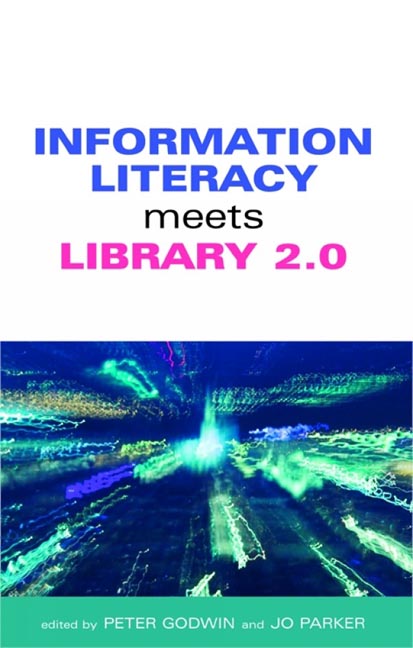Book contents
- Frontmatter
- Contents
- Contributors
- Acknowledgements
- Part 1 The basics 1
- Part 2 Library 2.0 and the implications for IL learning 37
- Part 3 Library 2.0 and IL in practice 75
- 6 Engage or enrage: the blog as an assessment tool
- 7 Using Wikipedia to eavesdrop on the scholarly conversation
- 8 Information literacy and RSS feeds at LSE
- 9 Library instruction on the go: podcasting at the Kresge Library
- 10 PennTags at the University of Pennsylvania
- 11 Sparking Flickrs of insight into controlled vocabularies and subject searching
- 12 Joining the YouTube conversation to teach information literacy
- 13 Going Beyond Google at The Open University
- 14 Using Web 2.0 to enhance the Staffordshire University Assignment Survival Kit (ASK)
- Part 4 The future
- Index
7 - Using Wikipedia to eavesdrop on the scholarly conversation
from Part 3 - Library 2.0 and IL in practice 75
Published online by Cambridge University Press: 08 June 2018
- Frontmatter
- Contents
- Contributors
- Acknowledgements
- Part 1 The basics 1
- Part 2 Library 2.0 and the implications for IL learning 37
- Part 3 Library 2.0 and IL in practice 75
- 6 Engage or enrage: the blog as an assessment tool
- 7 Using Wikipedia to eavesdrop on the scholarly conversation
- 8 Information literacy and RSS feeds at LSE
- 9 Library instruction on the go: podcasting at the Kresge Library
- 10 PennTags at the University of Pennsylvania
- 11 Sparking Flickrs of insight into controlled vocabularies and subject searching
- 12 Joining the YouTube conversation to teach information literacy
- 13 Going Beyond Google at The Open University
- 14 Using Web 2.0 to enhance the Staffordshire University Assignment Survival Kit (ASK)
- Part 4 The future
- Index
Summary
Every few months on the information literacy discussion list ILI-L someone will raise the question ‘how can I convince students not to use Wikipedia?’ At Oregon State University, we do the opposite. We require every one of our first-year composition students to use Wikipedia as a background source for a researched argument essay. In the last two years, activities using the collaboratively authored encyclopedia have become a cornerstone of our information literacy curriculum.
The challenge
In 2001, the Oregon State University (OSU) Libraries partnered with writing faculty to deliver information literacy instruction in every section of WR 121, OSU's First Year Composition (FYC) course. As the only course all OSU undergraduates are required to take, a major goal of FYC is to introduce students to the processes and practice of academic writing. When the libraries came on board our challenge became: how do we help FYC students learn to research like scholars?
OSU instruction librarians use the metaphor of a scholarly conversation to describe the process of academic research. Davidson and Crateau introduced this metaphor in 1998, after developing the idea for four years in OSU's Honors Writing Course. The conversation metaphor emphasizes broad, open-minded exploration. Just as someone (with social skills) will spend some time listening before jumping into a conversation with new people, someone with information literacy skills will ‘eavesdrop’ on the scholarly conversation taking place in the literature before developing and announcing their own thesis.
The ‘eavesdropping’ part of scholarly research is difficult to teach. In the early stages of our collaboration, librarians and writing faculty alike reported that too many students were developing their arguments first and doing their research later. For these students, ‘research’ meant ‘find quotations that support my thesis’. They were not learning from the sources they found; they were not discovering new ideas or lines of enquiry. In short, they were not researching like scholars.
To be successful we needed to do more than show students new databases and skills; to research like scholars they needed a new way of thinking about the nature of knowledge itself. To see this, it is helpful to look at the work of Ernest Pascarella and Patrick Terenzini (2005). In How College Affects Students, they review the huge body of research examining the cognitive, social and other skills students develop as a result of higher education.
- Type
- Chapter
- Information
- Information Literacy Meets Library 2.0 , pp. 87 - 94Publisher: FacetPrint publication year: 2008



